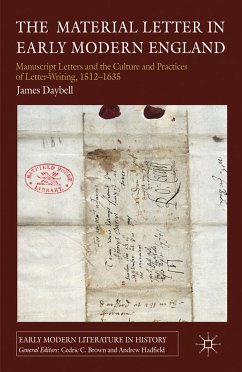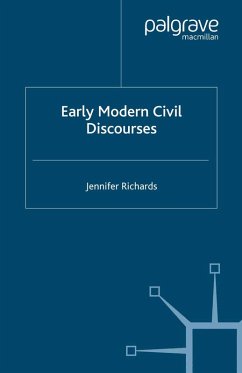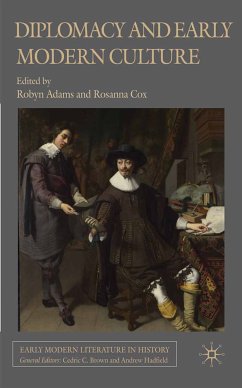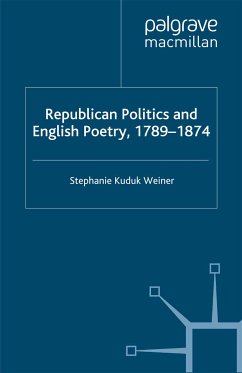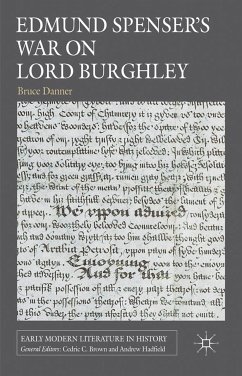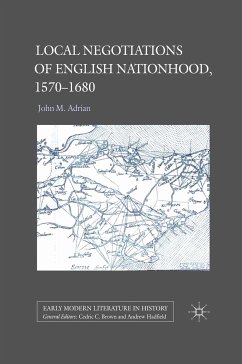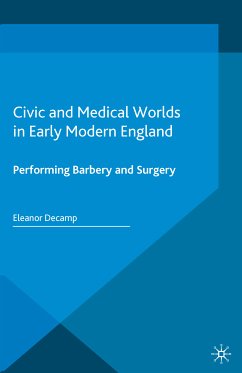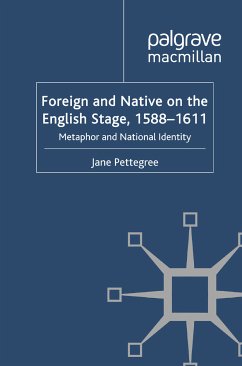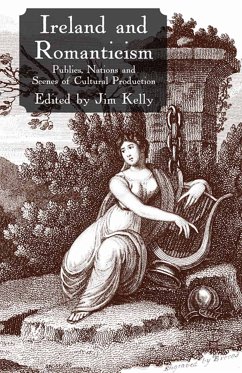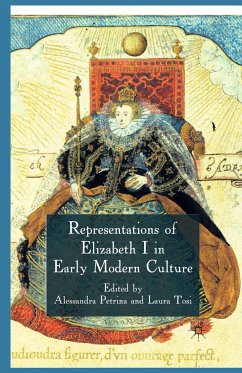
eBook, PDF
Representations of Elizabeth I in Early Modern Culture (eBook, PDF)

PAYBACK Punkte
36 °P sammeln!






The volume explores Elizabeth I's impact on English and European culture during her life and after her death, through her own writing as well as through contemporary and later writers. The contributors are codicologists, historians and literary critics, offering a varied reading of the Queen and of her cultural inheritance.
Dieser Download kann aus rechtlichen Gründen nur mit Rechnungsadresse in A, B, BG, CY, CZ, D, DK, EW, E, FIN, F, GR, HR, H, IRL, I, LT, L, LR, M, NL, PL, P, R, S, SLO, SK ausgeliefert werden.
CARLO M. BAJETTA Professor of English Literature at the Université de la Vallée d'Aoste, Italy PAOLA BASEOTTO Lecturer at the Università degli Studi dell'Insubria, Como, Italy EFFIE BOTONAKI Lecturer at the Greek Open University and Aristotle University, Greece GUILLAUME COATALEN Lecturer in Renaissance English Literature at the University of Cergy-Pontoise, France JANETTE DILLON Professor of Drama at the University of Nottingham, UK JONATHAN GIBSON Academic Co-ordinator at the English Subject Centre, Royal Holloway, University of London, UK GIOVANNI IAMARTINO Professor of English at the University of Milan, Italy KRISTINE JOHANSON PhD graduate from the University of St Andrews, UK JESSICA MALAY Reader in Renaissance Literature at the University of Huddersfield, UK KAVITA MUDAN PhD graduate in English Literature from the University of Oxford, UK YVONNE ORAM PhD graduate from the University of Birmingham, and has taught at the Open University, UK STEPHEN ORGEL Professor in the Department of English, Stanford University, USA SARA TREVISAN Caird Senior Research Fellow at the National Maritime Museum, Greenwich, UK
Produktdetails
- Verlag: Palgrave Macmillan UK
- Seitenzahl: 281
- Erscheinungstermin: 12. April 2011
- Englisch
- ISBN-13: 9780230307261
- Artikelnr.: 44922800
'This new essay collection makes a serious and significant contribution to studies of Elizabeth I. A diversity of approaches sheds new light on this iconic queen, investigating the materiality of her own writings as well as her influence on stagings of female power. We are invited to view her from perspectives of prophecy and nostalgia, and to look afresh at this endlessly fascinating monarch.' - Helen Hackett, University College London, UK
'This considered and cohesive sequence of essays on the cultural presence of Elizabeth I is both elegant and timely. The collection is given a distinguished focus in the Prologue contributed by the celebrated expert on Elizabethan culture and drama, Stephen Orgel, with its poised consideration
'This considered and cohesive sequence of essays on the cultural presence of Elizabeth I is both elegant and timely. The collection is given a distinguished focus in the Prologue contributed by the celebrated expert on Elizabethan culture and drama, Stephen Orgel, with its poised consideration
Mehr anzeigen
of the relation between the arts and the 'monarch's will.' Thereafter, the book's three sections explore the image and presence of the queen: in her own words, in the events and writings which she promoted and patronised, and in subsequent recollection and reinterpretation.
The focus throughout is international with significant work on Elizabeth's use of French and on Elizabeth's appearance in the eyes of an Italian contemporary. Her place in time is considered in many aspects: as a figure embodying past virtues, as the presiding goddess of a glorious present, and as the prophetess of a new order to come. One of the distinguishing features of this collection is the awareness which accompanies all these investigations of the elements of improvisation and insecurity which formed the counterpoint to the public triumphs of Elizabeth. There are particularly rich reflections on dramatic echoes of Elizabeth's governance in the plays of Webster and Shakespeare.
The continental focus of the volume is particularly welcome, offering the reader new discoveries on the map of the queen's world. This focus also points silently to a palpable absence of Elizabethan culture: the ambiguous withdrawal of her realm from the international respublica litterarum, from the possibility of comparison.
This collection is as notable for the careful selection of subjects and editorial shaping of a coherent whole as it is for the skill and knowledge of the individual contributors. The Introduction draws the whole volume together in its finely-nuanced consideration of Elizabeth as a subject placed in time.' - Peter Davidson, Professor of Renaissance Studies, University of Aberdeen, UK
The focus throughout is international with significant work on Elizabeth's use of French and on Elizabeth's appearance in the eyes of an Italian contemporary. Her place in time is considered in many aspects: as a figure embodying past virtues, as the presiding goddess of a glorious present, and as the prophetess of a new order to come. One of the distinguishing features of this collection is the awareness which accompanies all these investigations of the elements of improvisation and insecurity which formed the counterpoint to the public triumphs of Elizabeth. There are particularly rich reflections on dramatic echoes of Elizabeth's governance in the plays of Webster and Shakespeare.
The continental focus of the volume is particularly welcome, offering the reader new discoveries on the map of the queen's world. This focus also points silently to a palpable absence of Elizabethan culture: the ambiguous withdrawal of her realm from the international respublica litterarum, from the possibility of comparison.
This collection is as notable for the careful selection of subjects and editorial shaping of a coherent whole as it is for the skill and knowledge of the individual contributors. The Introduction draws the whole volume together in its finely-nuanced consideration of Elizabeth as a subject placed in time.' - Peter Davidson, Professor of Renaissance Studies, University of Aberdeen, UK
Schließen
Für dieses Produkt wurde noch keine Bewertung abgegeben. Wir würden uns sehr freuen, wenn du die erste Bewertung schreibst!
Eine Bewertung schreiben
Eine Bewertung schreiben
Andere Kunden interessierten sich für


